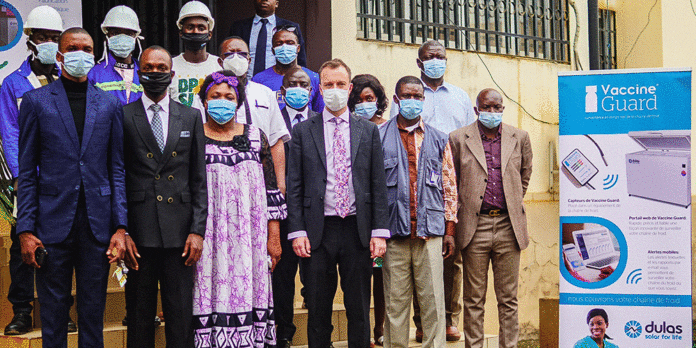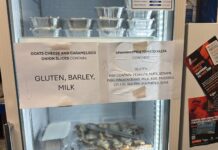
 Welsh renewables company Dulas has donated two solar powered refrigerators to Cameroon, which will contribute to the country’s capacity to deliver vital vaccines to its population. The award-winning renewable energy installer and consultancy pioneered off-grid solar vaccine storage in the 80s and has been supplying solar schemes and refrigeration to areas that need it most ever since.
Welsh renewables company Dulas has donated two solar powered refrigerators to Cameroon, which will contribute to the country’s capacity to deliver vital vaccines to its population. The award-winning renewable energy installer and consultancy pioneered off-grid solar vaccine storage in the 80s and has been supplying solar schemes and refrigeration to areas that need it most ever since.
The refrigerators were handed over at a ceremony held at the premises of the Expanded Programme for Immunization (EPI) in Yaoundé.
The donation follows a visit to Cameroon by Catherine McLennan, Head of International Sales at Dulas, to build local relationships and gain a better understanding of the country’s needs. Catherine explained that the equipment ‘will showcase the benefits such refrigerators can bring to remote communities who might otherwise miss out on the protection that vaccines provide’.
Among those attending the presentation ceremony were Dr. Judith Seunge – representing the Permanent Secretary of the EPI; Nigel Holmes – British Deputy High Commissioner to Cameroon; and representatives of MINSANTE (Cameroon’s Ministry of Health), the Cameroon Baptist Convention, World Health Organisation, and other key stakeholders.
Dulas’s local partner, Ndambi Ndaya of Hero Technologies provided a live demonstration of the refrigerator’s capabilities and workings and was on hand throughout the event to answer any questions.
Following the event, Hero Technologies transported the two refrigerators to their intended destinations and carried out the installation. They are now successfully installed at a government health facility in Abong-Mbang in the East region and the other (donated to the CBC) is in situ at the Ndu Baptist Health Center, in the Northwest region.
About the refrigerators
Many vaccines, including several Covid 19 vaccines, need to be kept at temperatures between +2° to +8°C to remain viable. The Dulas solar refrigerators are ideal because they run at a stable +5°C, thanks to a unique phase change material built into the wall lining of the refrigerators, which fluctuate between a liquid and a solid at +5°C and prevents the vaccines from freezing.
The VC50SDD refrigerators donated have a net vaccine capacity of 52.5 litres each, which is sufficient to hold Covid-19 vaccines (both doses) for more than 6,000 people. With an autonomy time of over 74 hours, vaccines are guaranteed to stay at the optimum temperature day and night, even during monsoon or cloudy periods.
One of the donated refrigerators included an extra feature – available as an option with every Dulas refrigerator – the Dulas ‘Vaccine Guard’, a remote temperature monitoring device enabling cold chain performance to be inspected 24/7 via a web portal that is accessible by computer, tablet or mobile phone. If the temperature varies from a specified range, the easy-to-use system sends real-time alerts by SMS and/or email to technicians to enable swift intervention and avoid potential vaccine wastage.
Further information
About Dulas
Dulas Ltd is a British company with almost 40 years’ experience manufacturing WHO-approved solar powered refrigerators for use in remote clinics and health centres around the world with little or no access to grid electricity. Our engineers pioneered this technology in the 1980s and we are now one of the world’s leading suppliers of vaccine cold chain equipment. Our mission is to help ensure that vaccines are accessible to all children and adults, no matter how remote their locations.
Dulas is the only UK-based manufacturer of WHO Performance Quality Standard vaccine refrigerators. We hold a Long-Term Agreement with UNICEF for the supply of our solar refrigerator systems to support their immunisation projects worldwide, as well as supplying directly to other charities and NGOs with whom we have built excellent relationships over the years.
Help keep news FREE for our readers
Supporting your local community newspaper/online news outlet is crucial now more than ever. If you believe in independent journalism, then consider making a valuable contribution by making a one-time or monthly donation. We operate in rural areas where providing unbiased news can be challenging. Read More About Supporting The West Wales Chronicle

























